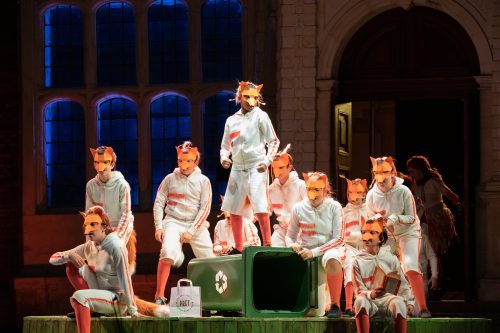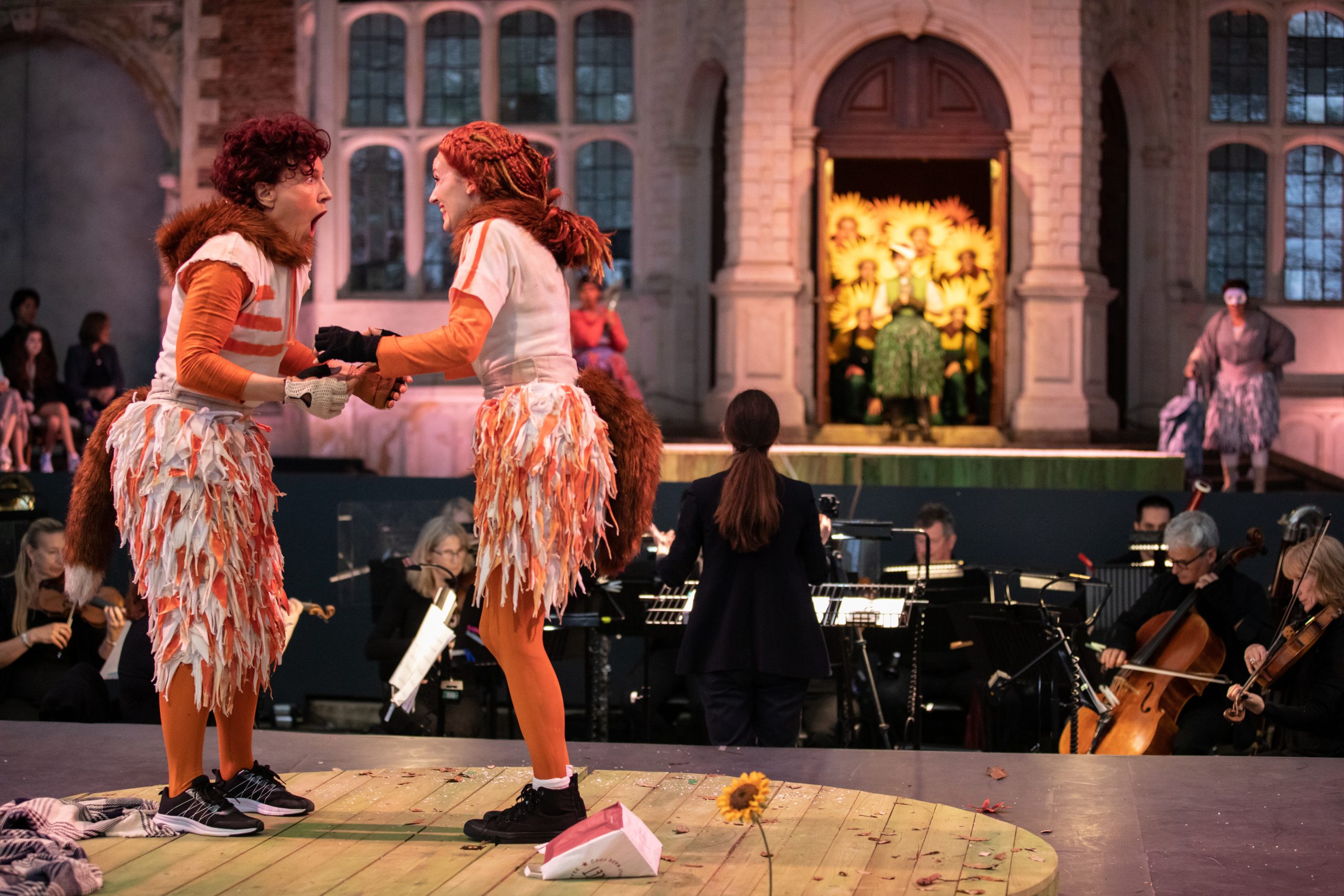 United Kingdom Janáček, The Cunning Little Vixen (Přiíhody lišky Bystroušky) sung in English in the chamber version by Jonathan Dove): Soloists, Chorus and Children’s Chorus of Opera Holland Park, City of London Sinfonia / Jessica Cottis (conductor). Holland Park, London, 13.7.2021. (CC)
United Kingdom Janáček, The Cunning Little Vixen (Přiíhody lišky Bystroušky) sung in English in the chamber version by Jonathan Dove): Soloists, Chorus and Children’s Chorus of Opera Holland Park, City of London Sinfonia / Jessica Cottis (conductor). Holland Park, London, 13.7.2021. (CC)

Production:
Director – Stephen Barlow
Designer – Andrew D. Edwards
Lighting – Rory Beaton
Choreography / Movement Director – Santa Piotrowski
Cast:
Vixen Sharp-Ears – Jennifer France
The Fox – Julia Sporsén
Forester – Grant Doyle
Forester’s Wife/Owl – Ann Taylor
Schoolmaster/Mosquito – Charne Rochford
Priest/Badger – John Savournin
Poacher – Ashley Riches
Chocholka – Harriet Eyley
Lapák, the dog – Natasha Agarwal
Jay/Rooster – Grace Nyandoro
Woodpecker – Chloë Pardoe
Innkeeper – Philip Costovski
Pepík – Alys Mererid Roberts
Frantík – Claire Ward
Frog – Daniel White
Caterpillar – Toby Yates
Grasshopper – Ben Jardim
Young Vixen – Estella Charlesworth
‘The Adventures of Vixen Sharp Ears’: and what adventures they were in this simply glorious, radiant performance. First things first: the opera was heard here in Jonathan Dove’s chamber version, premiered in Birmingham back in 1988, for single winds, two horns, trumpet, trombone, percussion, harp, accordion/celesta and strings. It is a masterpiece of deft orchestration; the role of the accordion in particular here highlighted and added a delicious ‘tang’ to the reduced sound. And the less happy announcement: the cancellation of Chuma Sijeqa for Covid-related reasons, who was due to make his OHP debut as the Poacher; he is due to sing Angelotti (Tosca) at Covent Garden in December. We wish him well and look forward to hearing him in the future. There was a luxury replacement, though, in Ashley Riches.
Stephen Barlow’s production takes the idea of the eternally renewing forest (celebrated in the Forester’s final contributions) and extends it to modern-day ‘green’ concerns. Peeking through the side before the performance, one could see some rehearsing and a green, ‘recycling’ wheelie bin onstage; one imagined the stage was in its final moments of preparation. But in fact, the wheelie bin was very much an integral part of Barlow’s staging, making the parallel between that eternal renewal of Nature and our current recycling concerns (a paper Pret a Manger bag also made an appearance; interestingly the Poacher toted his tinnies in a plastic bag, presumably a nod to his character’s penchant for destruction). That bin got plenty of use: and how Jennifer France (Vixen) balanced on top of it safely is beyond me (it also acted as a receptacle for characters). As with Le nozze di Figaro this summer (review click here), the stage extended around the orchestra, here with a green circular dais in front (on which France, after entering through the stalls, lay initially). Space was used beautifully – the full resources of the auditorium embraced Janáček’s masterpiece and, in the process, the audience itself became a vital, if silent component.
Talking of silence, France became a silent extra character in the first Inn Scene (as the gypsy girl Terynka presumably?) paying and leaving in annoyance at the boys’ (men’s) sexist dialogue about her. Children with lanterns added a magical touch as creatures of the forest; lighting throughout was beautifully done by Rory Beaton.
The many orchestral interludes were left to speak for themselves – and how they spoke. Before we consider anyone else’s achievement, it is worthwhile celebrating the excellence of conductor Jessica Cottis, who clearly inspires her players: the City of London Sinfonia have rarely sounded so engaged. Rhythmically (so vital in this piece – and in Janáček in general, come to think of it) and texturally, the orchestral contribution was beyond criticism. The jagged opening of the third act (a couple of violas, positioned for maximal effect to the conductor’s right) was perfectly of Janáček, an impeccable realisation of his soundworld. Given that there are zero opportunities for the instrumentalists’ concentration to flag anywhere in the evening, this performance was quite an achievement. The translucency of the experience in Dove’s version is what stood out (the only times one missed full symphony orchestra was when Janáček goes into full expansive lyric mode). Interestingly, Cottis continues her association with Dove in conducting his Exile (Concerto for baritone, cello and orchestra) in Bucharest in September this year. She also conducted Gerald Barry’s The Intelligence Park at the Royal Opera’s Linbury Theatre in 2019 (review click here).

Vocally, the performance belonged to France’s Vixen, ever expressive and, in dramatic terms, utterly convincing. France’s voice is miraculously free, eminently capable of taking anything Janáček throws at her in her stride. One of the most memorable scenes was that with the Fox, Julia Sporsén. The combination of France and Sporsén had triumphed before at Holland Park, as Zerbinetta and the Composer respectively in Richard Strauss’s Ariadne auf Naxos in 2018 (see my review click here). Fascinating to hear two singers so much at the top of their game: Sporsén’s voice is confident and clear and the two together created a real charge as Fox and Vixen. Hearing Sporsén as Waltraute in the Die Walküre of Stephen Langridge’s Gothenburg Ring a couple of years ago was a real treat, reviewed on this site by Niklas Smith (click here) and by myself elsewhere.
Seeing and hearing Grant Doyle (previously seen in Tchaikovsky Iolanta at OHP review click here) as the Forester was a treat, not least in that final Hymn to Nature. Doyle paced his assumption of the role as if his every contribution in the opera led to those final uplifting moments. Elsewhere in the male voices, I am not sure I would have known that Ashley Riches was just a substitution as the Poacher; his trademark confidence and command of the stage – he has huge stage presence – was there in full, as was his full-voiced delivery.
Casting was clearly carefully considered throughout: the men in the pub early on (Schoolmaster of Charne Rochford, Priest of John Savournin and Forester) had great rapport as well as contributing brilliantly individually; the lovely drunk Schoolmaster was a delight. Mezzo Natasha Agarwal’s Lapák the dog, deliciously costumed, of the smaller roles was particularly noteworthy and I hope to hear more of this RAM-trained singer. Soprano Harriet Eyley is a fine Chocholka: she makes her OHP debut in this role and will sing Vixen on 25 July. The experienced mezzo Ann Taylor, much associated with Dove’s works (as Sarah in Tobias and the Angel and Stewardess in Flight) was a fabulous presence as the Forester’s Wife and a beautiful sounding Owl while Yolanda Grant-Thompson was a memorable Innkeeper’s Wife.
The close with the Young Vixen of Estella Charlesworth and France’s Vixen in front of the open doors on the stage of OHP was infinitely memorable. It is impossible to write of this production and not mention the Children’s Chorus, so remarkably together – quite an achievement considering the composer’s rhythmic trickery.
The translation, too, was nicely managed, even interlacing in references to ‘peacocks’ through a cheeky little adaptation of text and referencing a world in which women may conduct orchestras (queue a grinning Jessica Cottis). Onstage social distancing was brilliantly achieved (and there was a sly elbow-bump Covid reference).
An invaluable recorded adjunct to this would of course be the Vixen released last year on LSO Live, with Lucy Crowe as Vixen and Gerald Finley as the Forester (LSO/Rattle). How lucky we are to have this veritable feast! And Stephen Barlow’s OHP production has it all – comedy, pathos, delight, tears; all superbly illuminated (in both senses) by Beaton. An absolute triumph, crowned by Jennifer France’s unforgettable Vixen.
Colin Clarke
